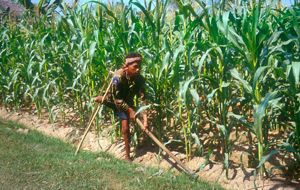MercoPress. South Atlantic News Agency
Millions of Asians in poverty because of agriculture neglect
 More than 200 million people living in poverty
More than 200 million people living in poverty Chronic neglect of agriculture in Asia and the Pacific has left over 200 million people in extreme poverty amid rising prices for foodstuffs and despite robust growth in other sectors, according to a United Nations report released Thursday.
The Economic and Social Survey of Asia and the Pacific 2008, produced by the United Nations Economic and Social Commission for Asia and the Pacific (ESCAP), says that 218 million people -- a third of the region's poor, largely living in rural areas -- could be lifted out of poverty by raising agricultural productivity. "The report asks the question why poverty still remains so high despite the much applauded high growth rates in the region," Jomo Kwame Sundaram, Assistant Secretary-General for Economic Development, said as he helped launch the study at UN Headquarters in New York. "The neglect of agricultural development and rural development has been among the main causes," he said. Launching the report in New Delhi with Indian Government officials, Noeleen Heyzer, Executive Secretary of ESCAP, said: "It is simply unacceptable that at a time when the economic growth of Asia and the Pacific has surpassed all expectations, we are not doing all that we can to improve the lives of more than 200 million people living in such poverty." This year's issue also marks the 60th anniversary of the Survey, founded in 1948 to examine the Asia-Pacific region's key short- and medium-term prospects and challenges in macroeconomic and selected social areas, especially from the point of view of minimizing human suffering. The 2008 survey, entitled "Sustaining Growth and Sharing Prosperity," calls for revitalization of agriculture through a focus on improving agricultural productivity and market orientation. Reforms in land policy are needed to connect the rural poor to cities and markets and to make it easier for farmers to access loans and crop insurance, says the survey, which also proposes skills diversification training, to help the poor, particularly women, tap more job opportunities. The survey also calls for a comprehensive liberalization of global trade in agriculture, as this would take a further 48 million people out of poverty in the region. "Without these measures, the gap between rich and poor in the region will only get wider and millions will be condemned to lives of persistent poverty," Ms. Heyzer said. Looking at overall prospects of Asia and the Pacific in the near term, the survey says that the region's robust economic growth will continue in 2008, despite economic uncertainties in the United States and the continued appreciation of regional currencies. The developing economies in the region are expected to grow at a slightly lower but still robust rate of 7.7 per cent in during the year, after having enjoyed the fastest growth in a decade in 2007. However, the survey sees rising food prices as a key challenge in coming months. Food price rises are a greater inflation challenge than oil prices as food accounts for a far higher proportion of consumer spending across the region. The survey projects that the shadow cast by the United States' economic situation is a long one, greatly contributing to the uncertainties that lie ahead.




Top Comments
Disclaimer & comment rulesCommenting for this story is now closed.
If you have a Facebook account, become a fan and comment on our Facebook Page!